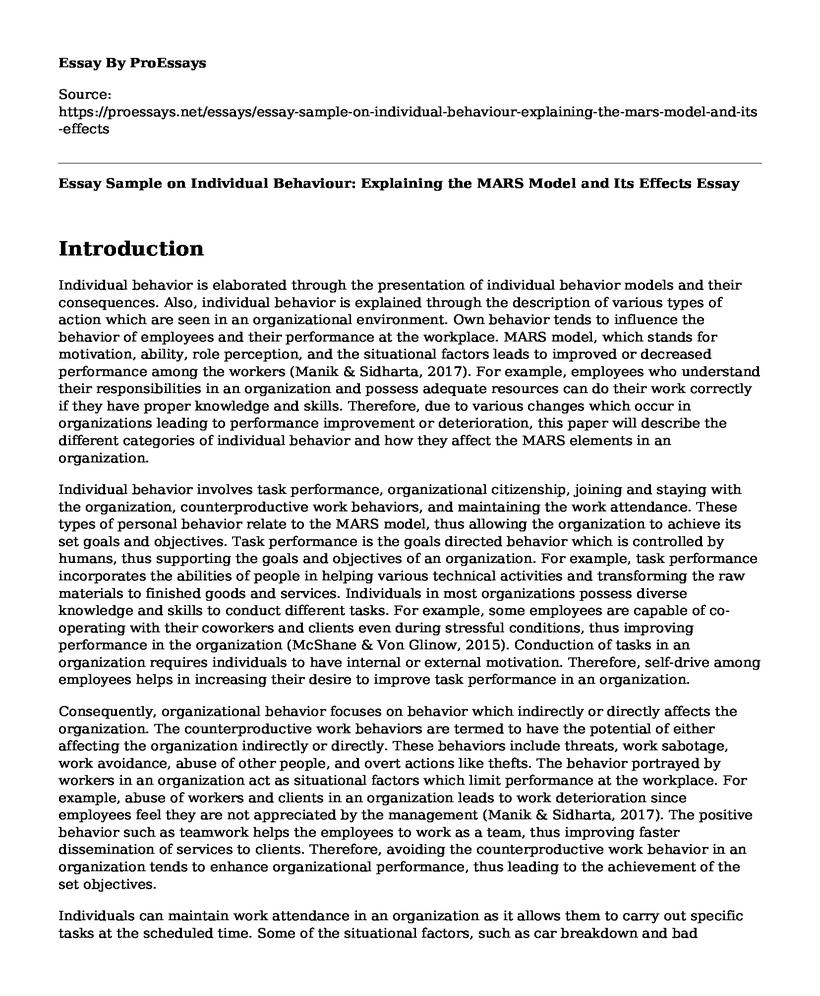Introduction
Individual behavior is elaborated through the presentation of individual behavior models and their consequences. Also, individual behavior is explained through the description of various types of action which are seen in an organizational environment. Own behavior tends to influence the behavior of employees and their performance at the workplace. MARS model, which stands for motivation, ability, role perception, and the situational factors leads to improved or decreased performance among the workers (Manik & Sidharta, 2017). For example, employees who understand their responsibilities in an organization and possess adequate resources can do their work correctly if they have proper knowledge and skills. Therefore, due to various changes which occur in organizations leading to performance improvement or deterioration, this paper will describe the different categories of individual behavior and how they affect the MARS elements in an organization.
Individual behavior involves task performance, organizational citizenship, joining and staying with the organization, counterproductive work behaviors, and maintaining the work attendance. These types of personal behavior relate to the MARS model, thus allowing the organization to achieve its set goals and objectives. Task performance is the goals directed behavior which is controlled by humans, thus supporting the goals and objectives of an organization. For example, task performance incorporates the abilities of people in helping various technical activities and transforming the raw materials to finished goods and services. Individuals in most organizations possess diverse knowledge and skills to conduct different tasks. For example, some employees are capable of co-operating with their coworkers and clients even during stressful conditions, thus improving performance in the organization (McShane & Von Glinow, 2015). Conduction of tasks in an organization requires individuals to have internal or external motivation. Therefore, self-drive among employees helps in increasing their desire to improve task performance in an organization.
Consequently, organizational behavior focuses on behavior which indirectly or directly affects the organization. The counterproductive work behaviors are termed to have the potential of either affecting the organization indirectly or directly. These behaviors include threats, work sabotage, work avoidance, abuse of other people, and overt actions like thefts. The behavior portrayed by workers in an organization act as situational factors which limit performance at the workplace. For example, abuse of workers and clients in an organization leads to work deterioration since employees feel they are not appreciated by the management (Manik & Sidharta, 2017). The positive behavior such as teamwork helps the employees to work as a team, thus improving faster dissemination of services to clients. Therefore, avoiding the counterproductive work behavior in an organization tends to enhance organizational performance, thus leading to the achievement of the set objectives.
Individuals can maintain work attendance in an organization as it allows them to carry out specific tasks at the scheduled time. Some of the situational factors, such as car breakdown and bad weather, can make employees absent from work. Also, employees who have work-related stresses might lack motivations to appear to work, thus affecting performance. Absenteeism at work tends to be higher in individuals who have strong absence norms making their coworkers expect many time offs (Mowday, Porter & Steers, 2013). Therefore, maintenance of work attendance among the employees propels the organization to higher levels since tasks are conducted at the scheduled time.
Additionally, organizations require cooperation and support for other individuals who act as stakeholders to the company. Organizational citizenship behaviors are directed towards helping other employees in dealing with their work issues and sharing of the work resources. Sharing different abilities among employees and other stakeholders help in the achievement of specific goals (McShane & Von Glinow, 2015). Employees provide ideas to organization management, which assist them during decision making. Therefore, through organizations citizenship behavior, the company can solve various problems which hinder them from improving their performance.
Conclusion
Therefore, individual behavior affects the MARS elements in an organization, thus improving or deteriorating the company's performance. For example, a lack of cooperation in an organization leads to failure of various tasks. Maintenance of individual behavior among the employees helps in the achievement of various goals and objectives. Also, task performance in organizations can be affected by the skills and knowledge possessed by workers. Therefore, a better relationship between people's behavior and MARS elements will propel the organization to higher levels.
References
Manik, E., & Sidharta, I. (2017). The Impact of Motivation, Ability, Role Perception on Employee Performance and Situational Factor as Moderating Variable of Public Agency in Bandung, Indonesia. International Journal of Management Science and Business Administration, 3(4), 65-73. Retrieved from https://www.researchgate.net/publication/317563952_The_Impact_of_Motivation_Ability_Role_Perception_on_Employee_Performance_and_Situational_Factor_as_Moderating_Variable_of_Public_Agency_in_Bandung_Indonesia
McShane, S. L., & Von Glinow, M. A. (2015). Organizational Behavior 7/e. McGraw-Hill Education. Retrieved from https://www.academia.edu/29097775/Mc_Shane_von_Glinow_Organizational_Behavior_ebook_Copy
Mowday, R. T., Porter, L. W., & Steers, R. M. (2013). Employee-organization linkages: The psychology of commitment, absenteeism, and turnover. Academic Press. Retrieved from https://www.sciencedirect.com/book/9780125093705/employee-organization-linkages
Cite this page
Essay Sample on Individual Behaviour: Explaining the MARS Model and Its Effects. (2023, Feb 15). Retrieved from https://proessays.net/essays/essay-sample-on-individual-behaviour-explaining-the-mars-model-and-its-effects
If you are the original author of this essay and no longer wish to have it published on the ProEssays website, please click below to request its removal:
- Nurture vs. Nurture and the Development of Human Personality Essay
- How Stress Affects Our Health Essay
- Essay Sample on Impact of Cannabis on PTSD Recovery
- Essay Example on Lockheed Martin: Reinventing Itself Through Ethical Knowledge and Responsibility
- Essay Example on Start a New Business: Unlock Freedom & Wealth With Financial Consideration
- Essay Example on Homosexuality: Pros & Cons in Individual Lives
- Research Paper Sample on PTSD: A Growing Challenge for U.S. Military Personnel







